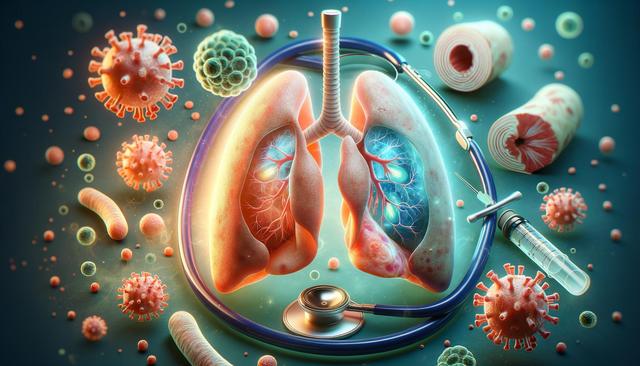Understanding Pneumonia and Its Health Impact
Pneumonia is a serious respiratory infection that affects the lungs, often causing symptoms like cough, fever, shortness of breath, and fatigue. It can be caused by bacteria, viruses, or fungi, and its severity can range from mild to life-threatening, especially in older adults, young children, and individuals with weakened immune systems. When left untreated or if not managed properly, pneumonia can lead to complications such as respiratory failure, sepsis, or lung abscesses. For populations at higher risk, the condition can result in prolonged hospital stays and increased healthcare costs.
A key aspect of managing pneumonia is recognizing the symptoms early and seeking medical attention promptly. Treatment varies depending on the underlying cause and severity, but often includes antibiotics for bacterial pneumonia, antivirals for viral strains, and supportive care such as oxygen therapy and fluids. Still, prevention remains a powerful tool, particularly through the use of Pneumonia Shots, which help reduce the burden of this illness on individuals and the healthcare system.
The Role of Pneumonia Vaccination in Prevention
Pneumonia Vaccination plays a crucial role in preventing specific types of pneumonia, especially those caused by Streptococcus pneumoniae bacteria. These vaccines are designed to boost the body’s immune response, enabling it to recognize and combat the bacteria before it causes serious illness. There are different types of pneumonia vaccines available, and healthcare providers can recommend the appropriate one based on age, health status, and medical history.
Groups that benefit significantly from Pneumonia Shots include:
- Adults aged 65 and older
- People with chronic conditions like diabetes, heart disease, or asthma
- Individuals with weakened immune systems
- Children under the age of 2
By incorporating Pneumonia Vaccination into routine healthcare, individuals can significantly enhance their Respiratory Health and reduce the risk of severe outcomes from pneumonia.
Health Protection Through Early Action
One of the most effective ways to protect your health is by being proactive. Pneumonia Shots represent a practical step in early disease prevention, offering long-term protection against common strains of pneumococcal bacteria. While the vaccine does not cover all types of pneumonia, it provides a meaningful reduction in the likelihood of developing the most dangerous forms.
Beyond personal health, vaccination also contributes to public health by reducing the spread of infection within communities. This is especially important during flu season or in environments where respiratory illnesses can spread rapidly, such as nursing homes, schools, or hospitals. It’s also worth noting that pneumonia vaccines can be administered alongside other routine vaccines, making it easier for individuals to stay up to date with their preventive care.
Recognizing the Benefits of Vaccination
The Vaccine Benefits associated with pneumonia prevention go beyond just avoiding illness. They include improved quality of life, fewer hospital visits, and reduced reliance on antibiotics—which is particularly important in the fight against antibiotic resistance. For individuals with underlying health conditions, Pneumonia Vaccination can mean fewer flare-ups of chronic illnesses and better overall health outcomes.
Some notable advantages of getting vaccinated include:
- Lower risk of serious lung infections
- Reduced likelihood of hospitalization
- Protection against complications like bloodstream infections and meningitis
- Improved community immunity, especially for those who cannot be vaccinated
These benefits make a strong case for making vaccination a central part of your long-term health plan, particularly if you belong to a high-risk group.
Maintaining Respiratory Health Year-Round
Respiratory Health is vital to overall well-being, particularly as we age or manage chronic conditions. Alongside Pneumonia Shots, maintaining healthy lungs involves a combination of lifestyle choices and preventive care. Avoiding smoking, staying physically active, practicing good hygiene, and managing conditions like asthma or COPD can all contribute to stronger lungs and better resistance to infection.
Additionally, staying informed about respiratory illnesses and their prevention helps individuals take appropriate actions before problems arise. Regular check-ups with a healthcare provider can ensure that vaccinations are current and that any signs of respiratory issues are addressed promptly. Emphasizing prevention over treatment not only safeguards personal health but also supports a healthier, more resilient community.
Conclusion: Prioritize Prevention for a Healthier Future
Pneumonia can be a serious threat, especially for older adults and those with chronic health issues, but it is also preventable. By embracing Pneumonia Vaccination as a cornerstone of Health Protection, individuals can significantly lower their risk of infection and its complications. The Vaccine Benefits extend beyond individual wellbeing, contributing to broader public health efforts and reducing the strain on medical systems.
Whether you’re managing an existing health condition or simply aiming to maintain good health, taking steps to protect your Respiratory Health through timely vaccines and healthy habits is a wise and effective strategy. Speak with a healthcare provider to learn more about your options and make an informed decision that supports long-term wellness.




Leave a Reply